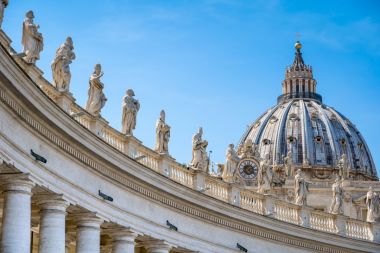Papal critic praises dubia by conservative prelates as 'heroic act'

A vocal critic of Pope Francis used a book event in Rome on Thursday to praise five senior prelates who accused the pontiff of bringing confusion in the church.
In July, the conservative Cardinals Raymond Burke of the United States, Walter Brandmüller of Germany, Robert Sarah from Guinea, Juan Sandoval Íñiguez of Mexico and Joseph Zen of Hong Kong sent Francis questions on the blessing of same-sex couples, the ordination of women and the pope's Synod on Synodality in the church tradition known as a dubia, or "doubts," in which popes answer for their policies. The dubia came as tensions over the Synod on Synodality, which ends this week, were mounting.
"I consider the dubia a great work that will go down in history as a heroic act," said Bishop Athanasius Schneider, the auxiliary bishop of Astana, in Kazakhstan, at the Thursday event, which took place steps from St. Peter's Square, where the synod participants were gathered.
Francis responded to the cardinals, but on Thursday, Schneider said his answers were insufficient. "The answers the pope provides are unsatisfactory," the bishops said, "they cause more questions than they resolve. The answers were confusing and sought to confuse."
Schneider's remarks echoed those of Zen, who described the pope's answers as "pastorally untenable" in a statement Oct. 12.
An ethnic German raised in Kazakhstan under the Soviet Union, Schneider emigrated with his family to Germany to escape Communist repression of their Catholic faith. He returned as a priest and was appointed auxiliary bishop of Astana in 2011.
He has become a defender of traditionalist views in the church, and has spoken in defense of the Old Latin Mass, as well as in opposition to Francis' moves to allow divorced and remarried Catholics to receive communion. During the Synod on the Amazon region in 2019, Schneider alleged that the meeting promoted "implicit pantheism."
The event was held to celebrate the publication of Schneider's book, "Credo: Compendium of the Catholic Faith," published in September, which follows in the spirit of recent guides to the Catholic faith by conservative prelates and lay people that focus on doctrine, implicitly or explicitly counteracting what they see as liberal influence on the church.
Jeanne Smits, a conservative Catholic blogger and translator, commended Schneider's book at the event, saying, "It holds something for any question you have, it tells you what to think on this or that issue."
Doctrinally, it breaks no new ground but expands on the official catechism issued by Pope John Paul II in 1992; however, it adapts that catechism to modern concerns, criticizing gender ideology, chastising bishops who closed their churches during the COVID-19 pandemic and taking on Francis' recent imposition of restrictions on the celebration of the Old Latin Mass.
Schneider also described worries about the environment, the subject of two of Francis' encyclicals, including Laudate Deum, released Oct. 4, as "ecological mysticism" and "idolatry."
Sarah, who attended the book event, told the audience that he hoped Schneider's book will "help the most humble who are hungry for the bread of healthy doctrine."
Speakers took jabs at other religious traditions at the event, especially Islam, but their ire was primarily aimed at the synod, which ends Sunday (Oct. 29). The meeting gathered bishops and other clergy with religious and lay Catholics to discuss some of the hot-button issues facing the church, including female ordination and the welcoming of LGBTQ Catholics.
At the event, Sarah praised the book for being published "at this time of great crisis in the church, of confusion, and especially when too often we hear discordant voices that come from the mouths of many prelates with high levels of responsibility regarding doctrinal and moral questions and the welcoming of ideologies that negate God and his teachings on the nature of man."
Pope Francis has avoided making any changes to official Catholic doctrine, but he has promoted a pastoral approach. He has met with LGBTQ individuals and advocates and encouraged open discussion on divisive questions at synods. Francis' own views on questions of female ordination or a married priesthood are traditional, as he has stated on several occasions in interviews and in public pronouncements.
For his own part, Schneider defended bishops' "freedom to speak to the pope," saying that many prelates "are intimidated." But he insisted that his criticism is born out of "brotherly love" for Francis, and that those who speak against Francis' vision nonetheless maintain a fealty to the pontiff.
"I have prayed for no one in my life more than I have for Pope Francis," he said.
© Religion News Service











